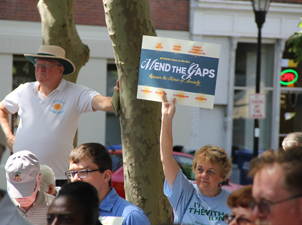
We Are There for Each Other
By Alice Kitchen
From NETWORK’s Catholic Social Justice Reflection Guide
My inspiration to pursue justice comes from a confluence of family, educational experiences, and exposure to many courageous faith leaders through the years. These remarkable leaders have spoken up when their voices were not welcome, marched in cold winter weather, disobeyed unjust laws, and became shields for those in harm’s way. I learned from them that to be silent is to be complicit in injustice and oppression.
In my community, I have found that working with our local Jobs with Justice (JwJ) organizers, a part of the national Jobs with Justice, as a Co-Member of Loretto has afforded me a deep connection to what Solidarity looks like up close. We, faith leaders, work as a part of the team supporting the priorities decided by the JwJ core committee. This has led us to work with unions in the low wage worker movement, now for the fourth year.
We must work to overturn the prejudice against workers and their right to unionize. Unions are the structural way to provide working people with human dignity. 100 years of Catholic Social Teaching is deeply pro-union and is loudly proclaimed in five major encyclicals.
Applying NETWORK’S 2020 Mend the Gaps policy vision locally, I focus on the wage gap for fast food workers, home care workers, child care workers, and adjunct faculty and their employers. As faith leaders and justice-seekers, we are encouraged to accompany them on such action steps as:
- Going out on strike when the workers exercise their legal right to strike without fear of being fired, connect them to the media ( we are not their voice, we amplify their voice)
- Securing signatures for referendum ballot initiatives and petitions, writing letters to the Editors, speaking out on talk radio and social media
- Joining with workers in the exercise of civil disobedience to witness to injustice
- Accompanying workers at rallies to demonstrate the need to shrink the wage gap, secure health care coverage, and sick leave and a family-friendly work place. (Remember the acompañamiento model, from the experience of women in Nicaragua working with Canadian social workers. Accompaniment is best characterized by nonintrusive collaboration, mutual trust, agreement on the social ill, egalitarian spirit, commitment to solidarity, and an agreed upon plan of action)
- Joining with a worker when they go to court, traveling to the state capital to educate elected officials to pass minimum wage laws- $15 and a union
Solidarity means working with organizations across our communities and states in a unified manner to carry out shared goals. That means we meet with them, create implementation plans, and support the identified lead agencies. Cohesion is a challenge as each organization has a unique mission and they often have differing approaches. This requires the hard work of identifying, analyzing and planning strategy. It can mean compromise, lining up behind others, and bringing our members along to support others.
The power of working in unison with others is: strength in numbers, voices, and the ability to leverage structural change and increase wages. This is not a one way street. Reciprocity is the ingredient needed to make this work. We are there for each other, standing in solidarity, no matter whether the issue is ecological reforms, payday lending regulators, health care coverage or minimum wage increases.
Alice Kitchen is a NETWORK board member, Co-member of the Sisters of Loretto, Adjunct Professor at the University of Missouri-Kansas City, School of Social Work, and retired Licensed Social Worker.







